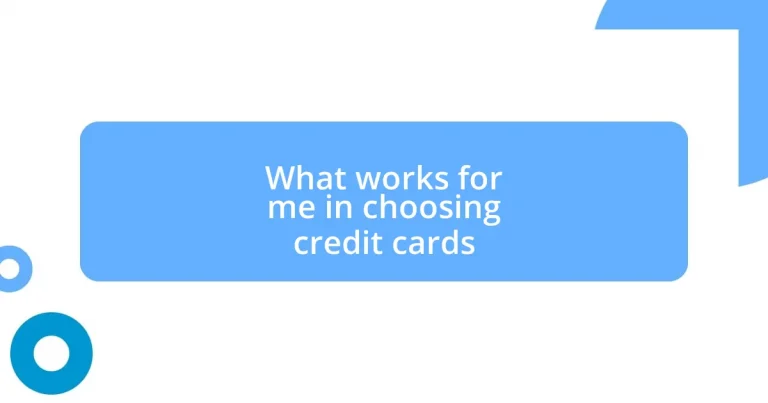Key takeaways:
- Understanding credit needs involves reflecting on spending habits, financial goals, and thoroughly reviewing credit limits and interest rates.
- Evaluating credit card features such as cashback rates, annual fees, and rewards flexibility is crucial for making informed choices that match one’s lifestyle.
- Analyzing interest rates and fees helps avoid financial pitfalls, with emphasis on understanding potential costs beyond just interest rates.
- Considering issuer reputation and customer service experiences is vital, as positive support can significantly enhance satisfaction with credit card use.
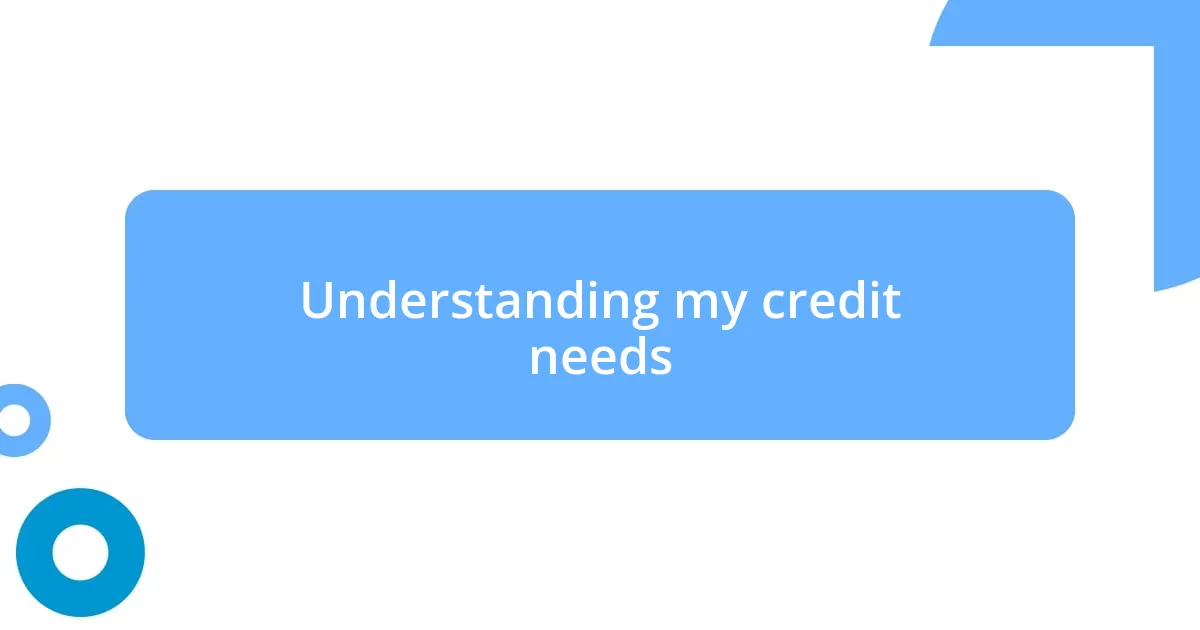
Understanding my credit needs
Understanding my credit needs starts with reflection on my spending habits and lifestyle. I remember when I was deciding between several credit cards, I realized I often travel for work. This pushed me to seek out cards offering travel rewards that match my frequent jet-setting. Have you ever considered how your daily expenses could influence the rewards you might choose?
I also think about my financial goals, which shape the types of credit I need. A few years back, I was saving for a major purchase—my first home. It dawned on me that I needed a card that would help build my credit score efficiently while giving me some cash back on everyday purchases. What are your immediate financial goals?
Lastly, I’ve learned that understanding the details of credit limits and interest rates is crucial. When I first started using credit cards, I made the mistake of not reading the fine print, which led to unexpected fees. This experience taught me to critically assess not just the rewards, but also the potential costs. How often have you found hidden fees surprising in your dealings?
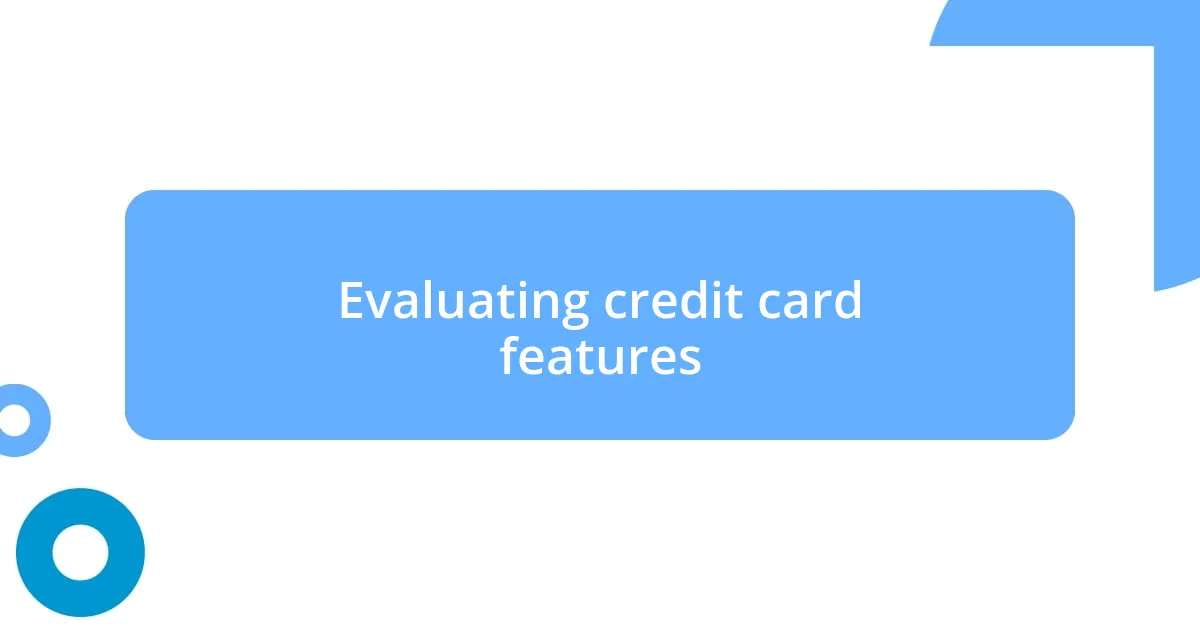
Evaluating credit card features
Evaluating credit card features is something I’ve come to appreciate over time. I remember the first time I really dove into the details. I was overwhelmed by the fine print, but I quickly realized that features like cashback percentages and travel benefits could make or break my decision. The more I understood these aspects, the better choices I could make to suit my lifestyle. Have you ever felt the rush of finding a card that perfectly aligns with your habits?
There are several key features I often weigh when evaluating credit cards:
- Cashback Rates: Some cards offer higher percentages for specific categories like groceries or gas, which can really add up.
- Annual Fees: Sometimes paying a higher annual fee is justified with valuable perks—understanding this balance is key.
- Interest Rates: While I try to pay off my balance each month, knowing the APR gives me peace of mind in case of emergencies.
- Rewards Flexibility: Whether it’s travel points or retail rewards, I prefer cards that offer options compatible with my spending preferences.
Making these assessments has turned credit card hunting from a chore into an empowering experience. Each feature I evaluate feels like a step toward mastering my financial journey. What features do you prioritize in your search?
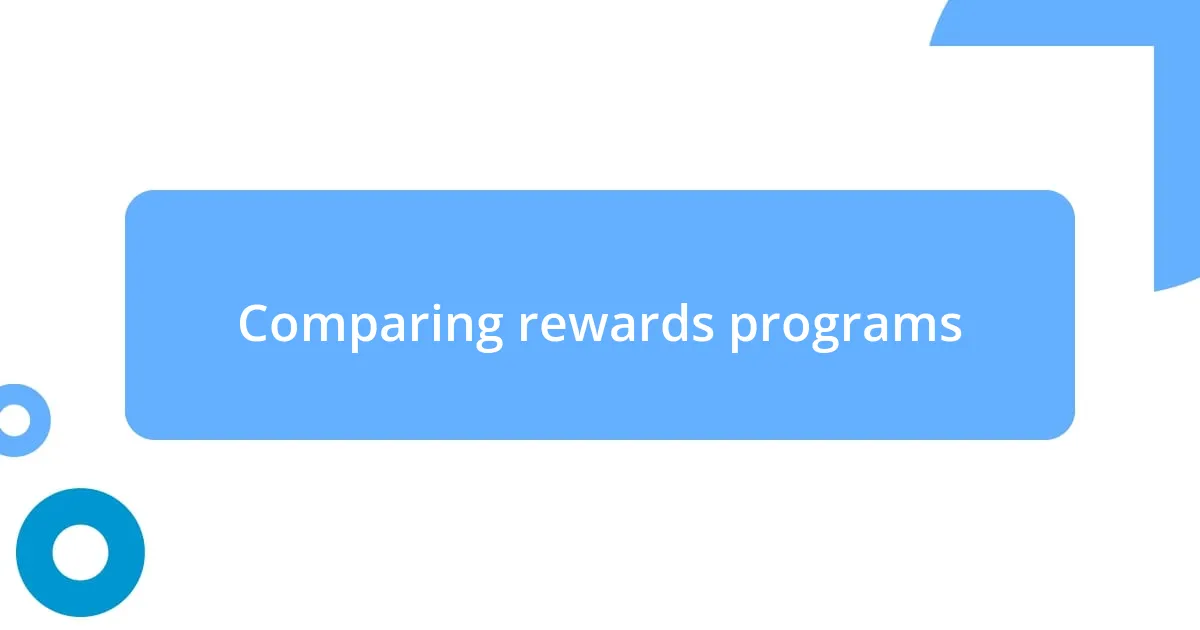
Comparing rewards programs
When it comes to comparing rewards programs, my first step is always to check how points or cash back can be earned based on my usual spending habits. For instance, I discovered a card that provided triple points on dining out, which was a game changer for me since I often enjoy dining with friends and family. It felt fantastic to see those rewards accumulate, almost like a bonus for doing something I love!
I also evaluate the redemption process because some cards make it easier than others. I distinctly recall using a travel rewards card for a trip to Europe, which allowed me to book flights with little hassle. However, another card had a complicated redemption process that left me frustrated and feeling stuck. This experience taught me that a seamless redemption experience is just as valuable as the amount of rewards accumulated—what’s the point of rewards if you can’t use them easily?
Additionally, I find it crucial to consider any bonus offers or promotional incentives. For example, when I signed up for one of my cards, they offered a sizable bonus after spending a certain amount within the first few months. This initial boost made a significant difference in my rewards balance. Have you ever taken advantage of such bonuses to kickstart your rewards program?
| Credit Card | Rewards Type |
|---|---|
| Card A | Cashback on groceries |
| Card B | Travel points for flights |
| Card C | Dining rewards points |
| Card D | Flexible rewards (both travel and cashback) |
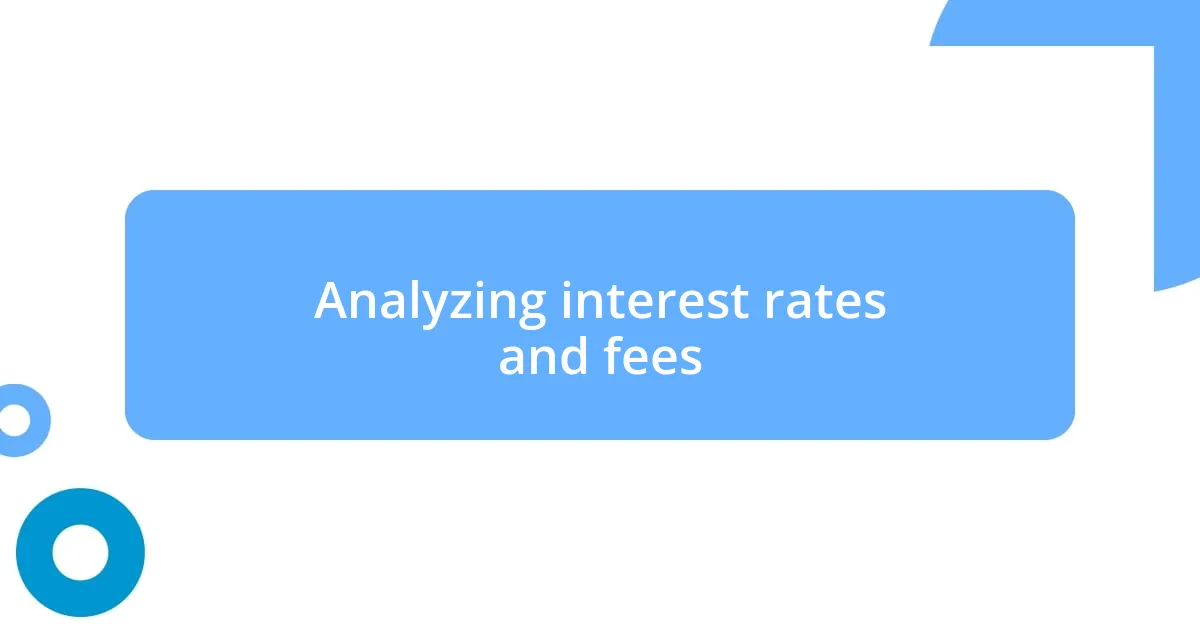
Analyzing interest rates and fees
When I analyze interest rates and fees, I often find myself reflecting on my financial habits. For instance, during my early credit card days, I neglected to consider the annual percentage rate (APR) until I made a late payment by accident. The interest charged felt like a punch in the gut. Now, I always make it a point to scrutinize APRs before committing, as that knowledge truly empowers me to make informed choices.
Fees can be sneaky little gremlins that catch you off guard. I once opted for a card that advertised no annual fee, but later discovered it had high foreign transaction fees. I planned a trip abroad and suddenly realized how this oversight would affect my budget. Now, I carefully look at all potential fees, including late fees and balance transfer fees, to ensure I’m fully aware of how they can impact my overall costs.
I believe understanding interest rates and fees is not just about numbers; it’s about peace of mind. Knowing I can effectively manage my credit card usage without falling into traps is liberating. Have you ever felt that anxiety when your monthly statement arrives, wondering how much interest you’ll face if you don’t pay in full? By keeping a close watch on these rates and fees, I feel more in control and less stressed about my financial choices.
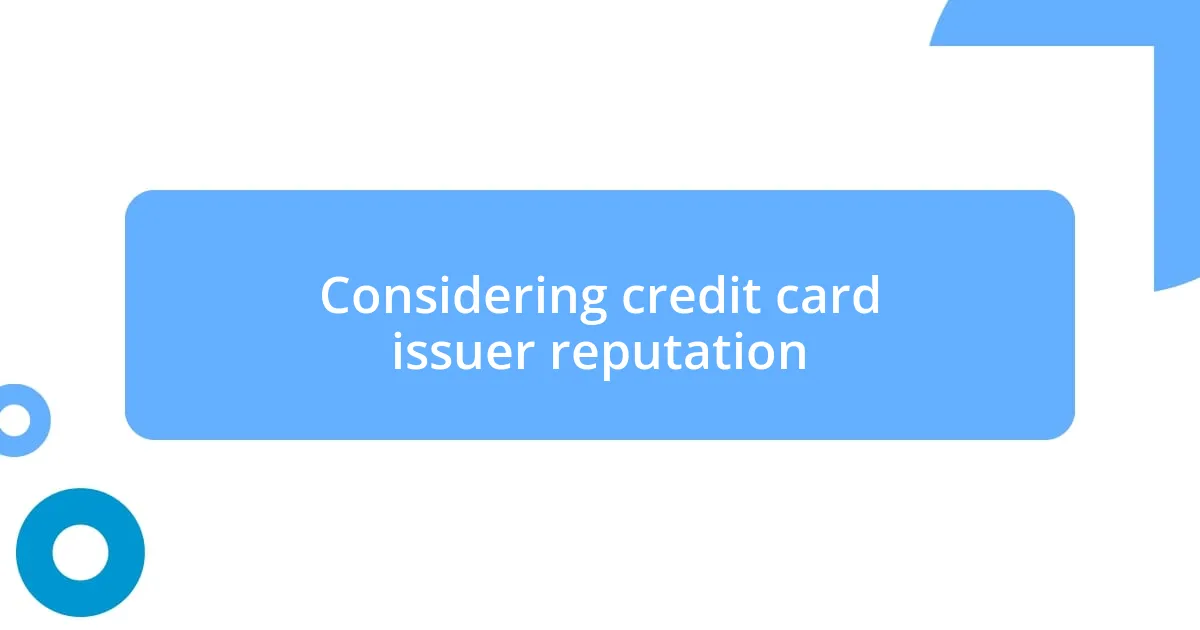
Considering credit card issuer reputation
It’s essential to consider the reputation of the credit card issuer before making a decision. In my own experience, I once chose a card with a flashy rewards program but didn’t research the issuer’s customer service rating. A few months in, I faced an unexpected charge and had the most frustrating time trying to reach out for assistance. This scenario really highlighted for me how important it is to select an issuer known for reliable customer support. When you need help, the last thing you want is to be stuck in long hold queues.
I’ve also learned that reading reviews from other cardholders can provide valuable insights about an issuer’s credibility. One time, I was drawn to a card because of its perks, but a quick scan of reviews revealed ongoing complaints about billing errors. This makes me wonder: how much is a great reward worth if the issuer can’t get the basics right? I ended up steering clear of that card, valuing a smooth experience over enticing offers.
Flipping the coin, I’ve had fantastic experiences with issuers known for their transparency and reliability. There was a card I used that not only had great rewards but also sent timely notifications about any updates to terms or potential fraud alerts. It felt reassuring to know that my finances were in safe hands. In choosing a credit card, I recommend seeing the issuer’s reputation as a window into how they might treat you as a customer. Have you ever wondered if that peace of mind is worth a bit of extra research? I truly believe it is.
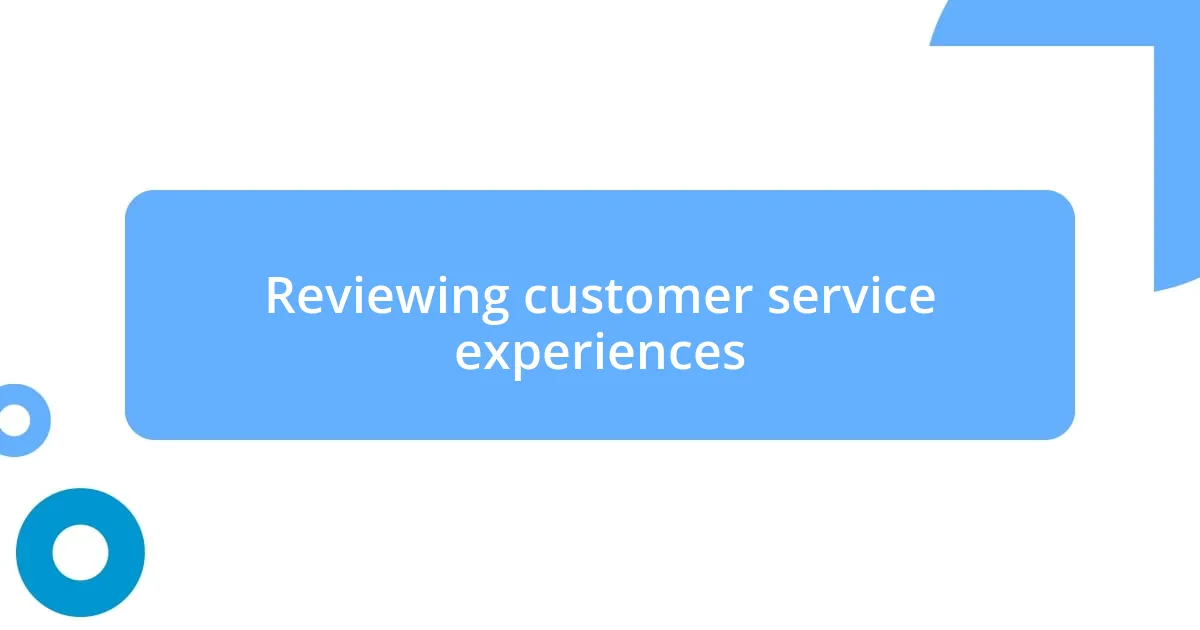
Reviewing customer service experiences
When it comes to customer service experiences, I can’t stress enough how crucial quick and effective support can be. There was a time when I lost my credit card while traveling. I was in a foreign country, and the last thing I wanted was to deal with a lackluster service team. Luckily, my issuer had a 24/7 helpline that answered my call promptly and resolved my issue in minutes. That experience left me feeling relieved and reminded me how essential responsive customer service is in choosing a credit card.
I’ve also learned that knowing how an issuer handles complaints can make all the difference. I remember reading a story about a friend who had to deal with multiple billing issues. She contacted her issuer, but it took forever to get a straightforward answer. Hearing her frustration made me reflect on the importance of good customer service; it’s not just about having a help line but actually resolving problems efficiently. Have you ever found yourself rebuffing a fantastic opportunity just because customer service seemed questionable? If so, you’re not alone.
On the flip side, positive interactions can create lasting loyalty. I recall a particular instance when I had a question about a complicated charge. The customer service representative not only clarified the issue but also offered tips on maximizing my rewards. It was a simple act, yet it made me feel valued as a customer. Experiences like this reinforce my belief that great customer service can transform an otherwise routine transaction into something genuinely satisfying. Isn’t it intriguing how even the smallest touchpoints can shape our perceptions of a brand?
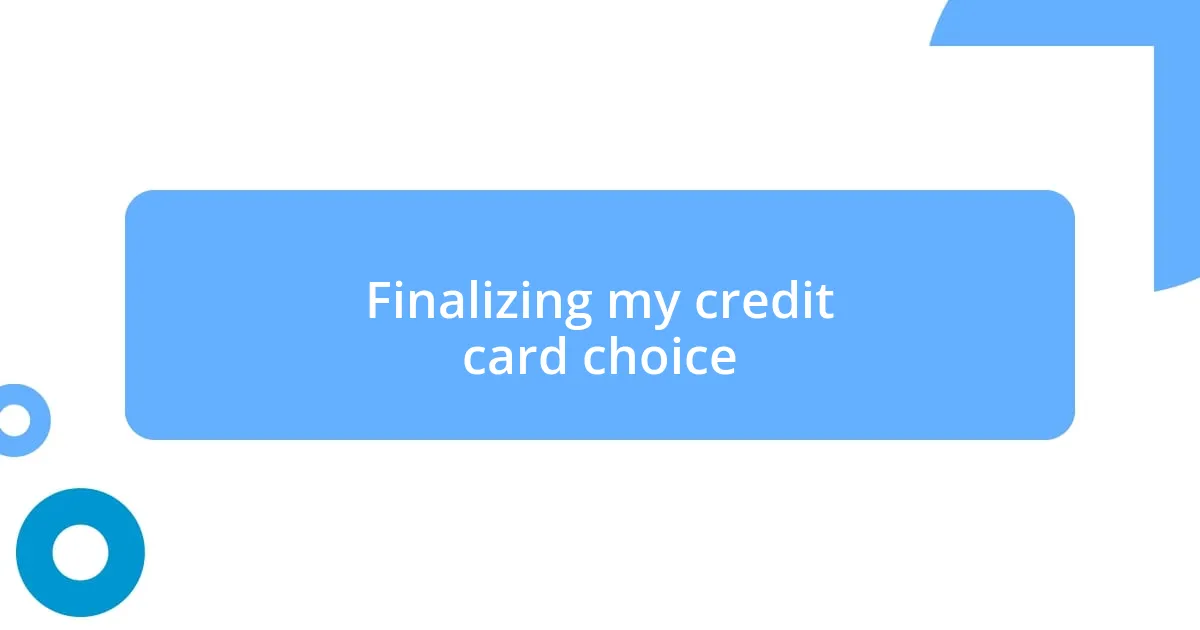
Finalizing my credit card choice
Finalizing my credit card choice often brings a mix of excitement and trepidation. Recently, I found myself at a crossroads deciding between two cards—one offered fantastic travel rewards and the other had lower interest rates. As I weighed the options, I realized I had to consider my spending habits and future needs carefully. Have you ever felt torn between benefits that sound incredible but may not suit your lifestyle? It’s essential to match your card choice with how you plan to use it.
One thing that stood out to me while finalizing my choice is the importance of the fine print. While reviewing the terms, I discovered hidden fees that could sneak up on me if I wasn’t careful. I remember moments when I’ve overlooked details and faced consequences later—like that time I activated a card that came with an annual fee, only to realize I hardly used it. It made me ponder: what’s the real cost of those appealing offers? Understanding what each card entails can save me a lot of headaches down the road.
Finally, I believe it’s worthwhile to trust my instincts during the selection process. Just the other day, I had narrowed down my options, but one card simply resonated with me more than the others. It felt like a fit—one that aligns with my financial goals and offers support I could rely on. It’s amazing how our gut feelings can guide us, isn’t it? After all the research and deliberation, sometimes the best choice is the one that feels right deep down.












